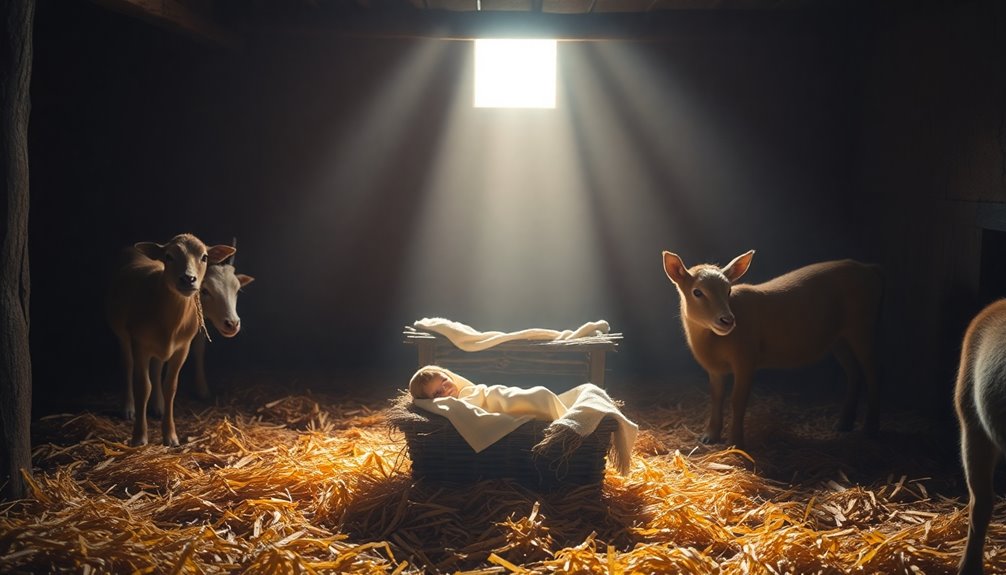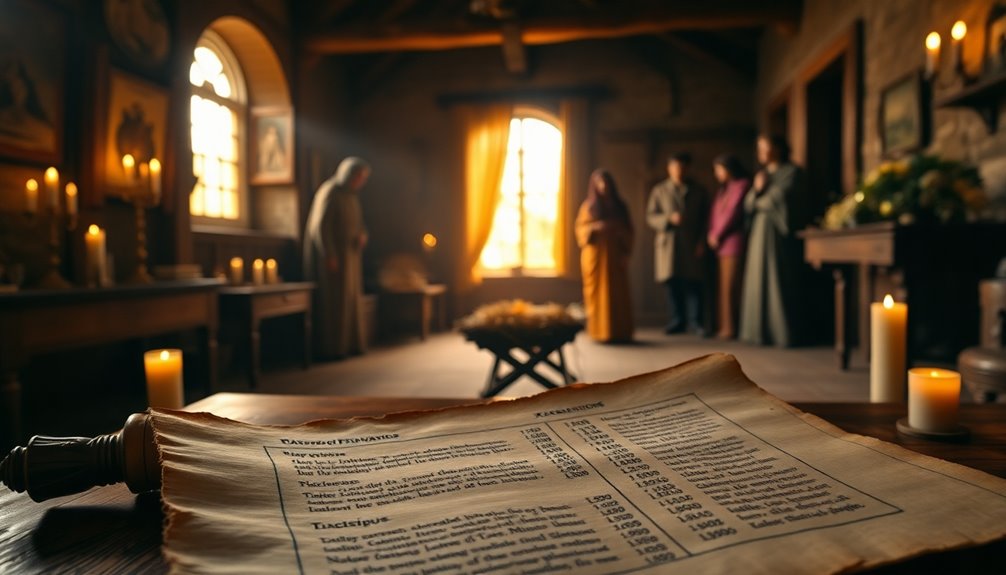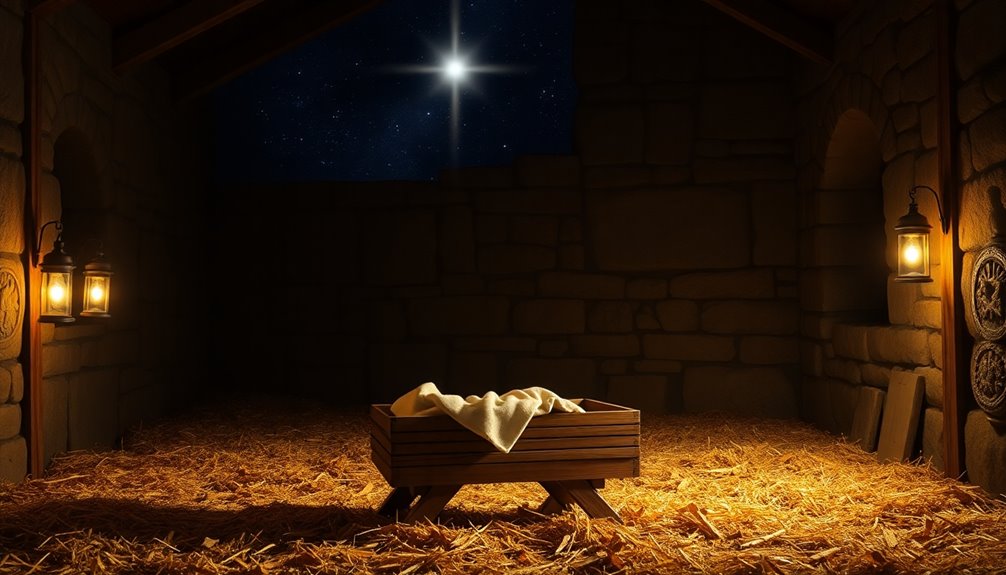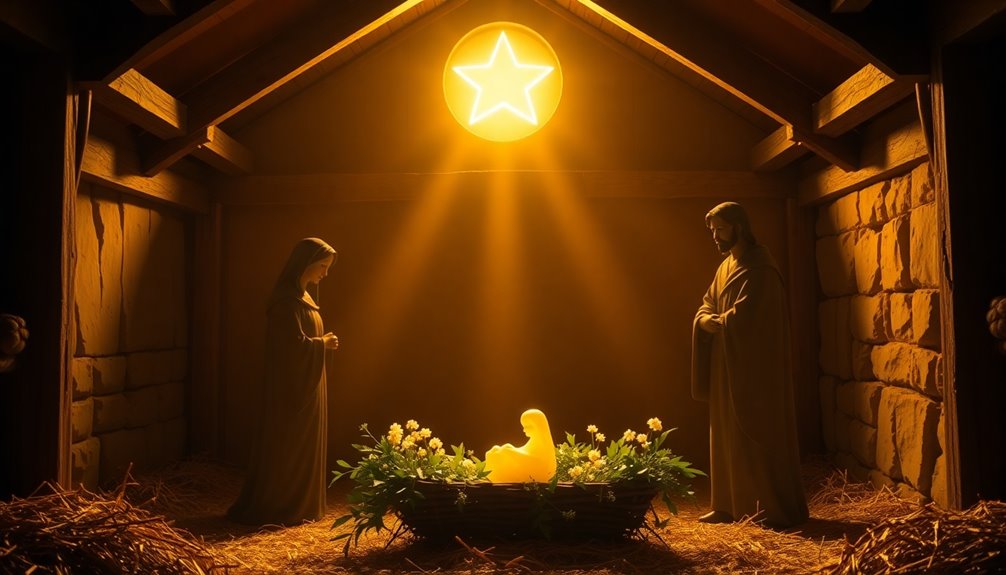You won't find an exact date for Jesus' birth in the Bible. Most scholars estimate it happened between 6 BC and 4 BC, during King Herod's reign. The Gospel of Luke mentions a census ordered by Caesar Augustus, which adds context but complicates the timeline. Various historical records suggest this census was around 6–7 AD, leading to confusion in pinpointing Jesus' birth date. Additionally, traditions like celebrating on December 25 arose much later, often merging with pagan festivals. If you're curious to learn more about the significance of these dates and events, there's much more to explore.
Key Takeaways
- Jesus' birth is estimated to have occurred between 6 BC and 4 BC during King Herod's reign.
- The absence of a year zero complicates the historical timeline for Jesus' birth.
- The Gospel of Luke references a census that may help pinpoint the approximate birth date.
- The visit of the Magi suggests Jesus could have been up to two years old at their arrival.
- December 25 was adopted as Jesus' birth date in the 4th century, aligning with pagan festivals.
Introduction

When it comes to Jesus' birth date, there's a lot of uncertainty. Historians and scholars have debated this topic for centuries, primarily because the exact date isn't specified in the Bible or any historical records. Most estimates suggest Jesus was born between 6 BC and 4 BC, during the reign of King Herod the Great, who died in 4 BC.
The Gospel of Luke offers some context, mentioning a census ordered by Caesar Augustus, which helps narrow down the timeframe.
Despite the establishment of December 25th as Christmas by the early Christian Church, there's no strong historical evidence to support this date as Jesus' actual birth date. Some theories propose that he might've been born in the spring, citing the presence of shepherds tending their flocks, which aligns with the timing of lambing season.
Moreover, calculations related to the birth of John the Baptist also play a role in these discussions.
Understanding the complexities surrounding Jesus' birth date allows you to appreciate the historical context and the various interpretations by Jewish priests and scholars alike.
Ultimately, the search for Jesus' true birth date remains a fascinating puzzle.
Biblical Birth Narratives

When you look at the biblical birth narratives, you'll find key accounts in the Gospels of Matthew and Luke.
Each Gospel presents unique details and perspectives about Jesus' arrival, from his humble beginnings to the significant visitors he received.
Understanding these primary and secondary references can help clarify the context and importance of his birth.
Primary Bible References
The primary biblical references to Jesus' birth are found in the Gospels of Matthew and Luke, each offering unique perspectives on this significant event.
In the Gospel of Matthew, you see the emphasis on the virgin birth and the fulfillment of the prophecy of Isaiah, which declares Jesus as Immanuel, meaning "God with us" (Matthew 1:18-25). Matthew also includes genealogies that trace Jesus' royal descent through Joseph, highlighting his rightful place in Jewish tradition.
On the other hand, the Gospel of Luke provides a detailed narrative of the birth of Jesus Christ. Luke 2:1-20 recounts how angels announced the birth to humble shepherds, leading them to visit the newborn laid in a manger due to a lack of room in the inn (Luke 2:6-7). This illustrates the humble circumstances surrounding Jesus' arrival.
Additionally, Matthew 2:1-12 tells of the Magi who recognized the significance of Jesus' birth, symbolizing its impact on both Jews and Gentiles alike. Together, these accounts create a rich tapestry of the events surrounding the birth of Jesus, emphasizing both his divine and human lineage.
Secondary Bible References
Alongside the primary accounts in Matthew and Luke, several secondary biblical references enrich our understanding of Jesus' birth narratives. Scholars believe that the year of Jesus' birth falls between 6 to 4 BC, correlating with the death of King Herod in 4 BC. This timeframe suggests the year he was born occurred shortly before Herod's death, aligning with the Magi's visit as described in Matthew.
The Gospel of Luke also provides context through the account of a census ordered by Caesar Augustus, further supporting the traditional date of Jesus' birth. The infancy narratives highlight the miraculous nature of his arrival, emphasizing both his divine kingship and humble beginnings.
While Matthew underscores Jesus' royal lineage through Joseph, Luke connects him to Adam, illustrating his human nature and universal appeal.
These differing perspectives from the infancy narratives reflect the theological emphases of early Christianity. Matthew's focus on kingship contrasts with Luke's portrayal of Jesus' connection to all humanity. Together, these accounts from biblical scholars deepen our understanding of the year of Christ's birth, enriching the narrative surrounding this pivotal event in history.
Roman Census Implications

Understanding the implications of the Roman census sheds light on the historical context surrounding Jesus' birth. The census, mentioned in the Gospel of Luke, mandated that individuals return to their ancestral homes for registration.
You might find it intriguing that this event is believed to have occurred around 6-7 AD, yet it points to a birth year for Jesus earlier than that, before King Herod's death in 4 BC.
This census is associated with Quirinius, the governor of Syria, which complicates timelines, especially since historian Josephus records Quirinius's census occurring after Herod's reign.
For Joseph and Mary, the journey to Bethlehem wasn't just a family visit; it carried significant implications regarding the changing demographic and political landscape of the Roman Empire.
This requirement to travel highlights the broader influence of Roman governance on the Jewish population, suggesting a more complex backdrop for Jesus' birth.
The timing of the census implies that Jesus was likely born around 7-4 BC, challenging traditional chronologies within early Christian narratives and emphasizing the socio-political environment of that era.
Census Timing Implications

Census timing significantly impacts the estimation of Jesus' birth date, intertwining historical records with biblical narratives. According to the Gospel of Luke, Caesar Augustus ordered a census requiring people to return to their ancestral homes for registration. This mandate is crucial when considering the timing of Jesus' birth.
Historical records indicate that Quirinius governed Syria around 6 AD, which leads some scholars to suggest a later birth date for Jesus. However, the Jewish historian Josephus hints that a census could have occurred earlier during Herod's reign, aligning with the estimated birth years of Jesus between 6 BC and 4 BC.
This discrepancy creates a complex situation where the timing of the census directly influences when we might pinpoint Jesus' birth date. The travel of Mary and Joseph to Bethlehem, driven by the census registration, suggests that Jesus was born during this period of significant movement.
This debate over census timing reveals the challenges in reconciling biblical accounts with historical records, complicating your understanding of Jesus' exact birth date. As you explore this topic, keep in mind how these overlapping narratives shape the nativity story.
Misunderstanding the Nativity Timeline

You might think the timeline of Jesus' birth is straightforward, but there are plenty of misconceptions to clear up.
Historical calendar discrepancies and the lack of a specific birth date in the Bible have led to various interpretations.
Let's explore how these misunderstandings shape our view of the nativity.
Debunk Nativity Misconceptions
Misconceptions about the Nativity timeline often cloud our understanding of Jesus' birth. Many people mistakenly believe that the date of Jesus' birth is clearly stated in the biblical account, but it's not. Most scholars estimate that it occurred between 6 and 4 BC, during the reign of Herod the Great, who died in 4 BC. The Gospel of Luke mentions a census ordered by Caesar Augustus, helping to establish a timeline, but it doesn't pinpoint an exact date.
You might also think Christmas celebrations on December 25th reflect Jesus' real birthday. However, this date was established centuries later, likely influenced by pagan traditions surrounding the winter solstice.
Furthermore, the presence of shepherds in the fields during Jesus' nativity suggests a warmer season, making a fall or early spring birth more plausible than a winter date.
The timing of the birth is further complicated by the visit of the Magi, which, according to some interpretations, may have happened up to two years after Jesus was born.
Understanding these aspects can clarify the real context behind the Nativity story, leading you closer to grasping the significance of Jesus' actual birthday.
Historical Calendar Discrepancies
Understanding the complexities of the Nativity timeline requires examining the historical calendar discrepancies that have arisen over the centuries. The most notable issue stems from Dionysius Exiguus' miscalculation, which placed Jesus' birth in AD 1, but scholars now suggest it likely occurred between 6 BC and 4 BC. This confusion is intensified by the absence of a year zero, complicating the timeline further.
The Gospel of Luke mentions a census during the time Quirinius was governing Syria, which aligns with historical records indicating a census around AD 6-7. This conflicts with the traditional dating methods, as Josephus' accounts suggest Jesus was born at least four years earlier than AD 1.
Moreover, the discrepancies in the historical calendar are exacerbated by translation errors in biblical texts and varying reliability of historical sources. As a result, the date of birth remains a topic of debate among scholars.
The Massacre of the Innocents, tied to the Nativity narrative, also adds layers of complexity, intertwining elements from the Old Testament and New Testament, further muddling the timeline established by Christian tradition.
Cultural Celebrations of Birth

When you think about cultural celebrations of birth, it's hard to ignore how personal faith shapes these events.
You might find that faith-based community gatherings bring people together, creating a sense of unity and shared purpose.
Reflecting on these traditions can deepen your connection to both your beliefs and your community.
Reflect on Personal Faith
During the Advent season, many people find themselves reflecting on their personal faith as they participate in cultural celebrations of Jesus' birth. This time of preparation invites you to explore your beliefs and the significance of Christmas in your life.
As you engage in various traditions, whether it's lighting candles, singing carols, or sharing meals, you foster a deeper connection to your community and the message of Jesus.
The joyful atmosphere of Christmas encourages acts of generosity and goodwill, reminding you of the gifts the Magi brought to Jesus. This spirit of giving resonates deeply, as it reflects the hope and love central to the holiday's message.
You might find that these celebrations provide moments of profound insight into the salvation Jesus offers, making the experience more meaningful. The emphasis on community and cooperation during this season echoes the values found in ancient cultures that celebrated togetherness and shared beliefs.
As you celebrate with family and friends, consider how your faith shapes your understanding of this season. The cultural significance of Christmas lies not only in its traditions but also in the opportunity to share the message of hope and love with others.
Embrace this time to reflect, connect, and celebrate the gift of faith that Jesus represents in your life.
Faith-Based Community Gatherings
Faith-based community gatherings frequently play a vital role in cultural celebrations of Jesus' birth, creating opportunities for fellowship and shared experiences.
During the Advent season, you can engage in preparations that build anticipation for Christmas, reflecting on the significance of the birthday of Jesus. These gatherings often incorporate cherished traditions, like caroling and candle lighting, inviting everyone—believers and non-believers alike—to join in the festivities.
As you celebrate Jesus, the themes of hope and light shine brightly through these communal events. Gift-giving, inspired by the Magi's offerings, symbolizes generosity and goodwill, reinforcing the spirit of the season.
Faith-based communities often hold special church services on Christmas Eve, blending unique cultural customs with the core message of salvation found in Christ's birth.
These gatherings not only foster a sense of belonging but also remind you of the theological significance of Jesus' arrival. By participating in these celebrations, you contribute to a collective experience that emphasizes the joy and promise of the season, deepening your connection to both your faith and your community.
Celebrate this special time together, and let the light of Christ illuminate your heart.
Significance of December 25

Celebrating December 25 as Christmas holds deep significance for many, intertwining historical and cultural threads. This date was officially adopted by the Roman Catholic Church, aligning it with the winter solstice and existing pagan festivals that celebrated the return of longer days. The earliest recorded mention of December 25 as Jesus' birth date dates back to around 200 C.E., with celebrations gaining momentum in the 3rd century.
The choice of December 25 reflects an effort to co-opt and Christianize pagan traditions, particularly the Roman festival of Sol Invictus, which honored the sun god. While historical accuracy raises questions—like the likelihood of shepherds tending flocks in Judea's cold winter—this date transcends such debates.
December 25 symbolizes hope, light, and renewal, resonating deeply with the Christian narrative of Jesus' birth. It transforms the darkest time of the year into a celebration of divine light entering the world.
Additional Resources

Exploring the historical context of Jesus' birth can deepen your understanding of the significance behind the Christmas celebration.
To further enrich your knowledge, consider delving into the historical estimates surrounding Jesus' birth, which suggest it occurred between 6 and 4 BC during King Herod's reign. The Gospel of Luke provides valuable insights, mentioning a census ordered by Caesar Augustus, which helps date this pivotal event.
You might also explore celestial events, as some theories propose that a notable planetary conjunction in 2 BC could correlate with Jesus' birth.
While December 25th is widely recognized as Christmas Day, it's essential to note that the early Christian church established this date without strong historical evidence linking it directly to Jesus' actual birth.
For a more nuanced understanding, look into alternative theories, such as March 20th, which arise from calculations involving Zechariah's priestly service and significant celestial occurrences.
Engaging with these resources can illuminate the complexities surrounding Jesus' birth and the various interpretations that have emerged over time, enhancing your appreciation for the season.
Frequently Asked Questions
What Is the True Date of Jesus Birth?
Determining the true date of Jesus' birth is complex. Most scholars suggest it occurred between 6 and 4 BC, during King Herod's reign.
The Gospel of Luke mentions a census that might help pinpoint the time. Some theories propose a September birth based on shepherds in the fields, while others link astronomical events to significant dates.
Although Christmas is celebrated on December 25th, there's little historical evidence supporting it as Jesus' actual birth date.
Was Jesus Actually Born on 25 December?
You might be surprised to learn that there's no definitive evidence proving Jesus was born on December 25.
While this date was adopted by the Roman Catholic Church in the 4th century, it aligns more with pagan festivals than historical records.
Scholars suggest that the timing of shepherds in the fields hints at a spring birth instead.
Ultimately, the exact date remains uncertain, shaped by tradition rather than concrete historical evidence.
When Was Jesus Born From Today?
You might wonder when Jesus was born from today's perspective. Most scholars estimate his birth occurred between 6 and 4 BC, during King Herod's reign.
While the Gospel of Luke mentions a census that helps frame this timeline, the exact year remains uncertain.
Astronomical calculations and historical debates suggest various dates, but no definitive answer exists.
Ultimately, you'll find that the exact date of his birth is still a topic of discussion.
Was Jesus Born on April 6th?
You might find the idea that Jesus was born on April 6th intriguing.
Some scholars argue this date aligns with historical and astronomical events, particularly the spring equinox and Passover.
It's thought this timing reflects significant agricultural cycles in Jewish tradition.
While it's a compelling theory, there's no definitive evidence confirming this date, leaving room for various interpretations and discussions among historians and theologians alike.










